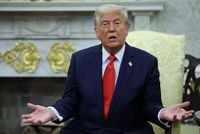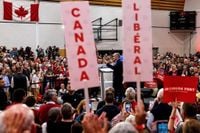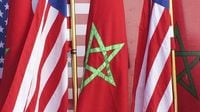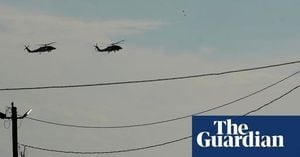In the turbulent aftermath of U.S. President Donald Trump’s re-election, the geopolitical landscape has shifted dramatically, particularly for Canada, which finds itself grappling with the implications of the America First agenda. This approach has not only threatened established trade relations but has also sparked a wave of Canadian nationalism, reshaping the political dynamics ahead of the upcoming federal elections.
Since Trump secured his second term, Canada has been at the forefront of the fallout from his policies, which include tariffs and a controversial suggestion to annex Canada as the 51st state. The Canadian government has responded with a mix of concessions and counter-tariffs, framing the situation as an economic war that could have severe repercussions for both nations.
Canadians are feeling a deep sense of betrayal and loss of trust, emotions reminiscent of historical grievances stemming from the era of Manifest Destiny. The once-strong ties between the two nations have frayed, leading to boycotts of U.S. products, boos directed at the U.S. national anthem during sporting events, and a surge in pro-Canada rallies.
In a significant political shift, former Prime Minister Justin Trudeau has resigned, paving the way for Mark Carney, the former governor of the Bank of Canada and the Bank of England, to take the helm of the Liberal Party. In less than 100 days, Carney has turned the party’s fortunes around, moving from a 20-point deficit against Pierre Poilievre’s Conservative Party to a comfortable lead in the polls. The Economist has rated the Liberals with an 83 percent chance of winning the upcoming election on April 28 and a 73 percent chance of securing a majority.
Trump's influence looms large over the Canadian political landscape, with the election campaign centered on who can best stand up to him. Carney is viewed as a national champion against Trump's policies, while Poilievre has adopted a 'Canada First' approach, criticizing Trump and advocating for a stronger Canadian position in future negotiations.
Historically, foreign policy issues have had little sway over Canadian voters, but this election is different. The sentiment surrounding America First has become a focal point, with Poilievre hinting at a restorationist approach that seeks closer alignment with the U.S. on defense spending and border protection.
In contrast, Carney’s strategy is one of diversification and partial decoupling from the U.S. economy. He recently stated, “the old relationship we had with the United States, based on deepening integration of our economies and tight security and military cooperation, is over.” This reflects a growing recognition that while Trump may be a temporary presence, his policies are indicative of deeper trends in U.S. politics.
Since 2017, Canada has proactively signed 16 trade deals with European and Asian partners, signaling a commitment to trade diversification. The country aims to reinforce regional arrangements like the Comprehensive and Progressive Agreement for Trans-Pacific Partnership and to support radical reforms of global institutions like the World Trade Organization.
As Canada navigates this new reality, trade diversification and strengthening ties with Japan, South Korea, Taiwan, Southeast Asia, and India are top priorities. However, relations with China, which have been strained, will need to be reassessed. The Liberal Party has shown reluctance to engage in discussions about China ahead of the election, but a realistic approach will be necessary if they emerge victorious.
Canada’s long-standing alignment with the U.S. on major foreign policy issues is being challenged as Trump’s America First policies reshape the international order. The implications for Canada are profound, as it faces the prospect of either separating from or restructuring its deeply integrated economy and security connections with the U.S.
In the context of ongoing global tensions, particularly in Eastern Europe, Trump recently commented on the potential for Russia and Ukraine to engage in significant business with the U.S. if they can secure a peace deal. This statement came amid a fragile ceasefire declared by Russian President Vladimir Putin, which has been marred by numerous violations.
Trump threatened to withdraw U.S. support for the peace process if negotiations falter, stating, “Hopefully Russia and Ukraine will make a deal this week.” His remarks highlight the transactional nature of U.S. foreign policy under his administration, where economic interests often take precedence over diplomatic stability.
As the conflict continues, the U.S. has also ramped up military operations in Yemen, targeting Houthi positions in response to their threats against international shipping lanes. These airstrikes have resulted in significant casualties and underscore the ongoing complexities of U.S. military engagements in the region.
Ahmed Fathi, an international affairs analyst, emphasizes that the U.S. withdrawal from international organizations under the Trump administration has profound implications for global governance. He notes that Morocco, with its strong ties to the U.S., could emerge as a key player in green energy and trade, positioning itself advantageously amid the shifting geopolitical landscape.
As Trump’s America First ideology continues to reshape global relations, the winners are likely to be those agile trading partners who can adapt to the new economic realities. For countries like Morocco, this presents an opportunity to expand exports and strengthen partnerships with the U.S.
In summary, Canada is at a crossroads, facing the dual challenges of navigating its relationship with an increasingly unpredictable U.S. and redefining its role in a rapidly changing global order. The upcoming federal election will be pivotal in determining how Canada responds to these challenges and what path it chooses moving forward.







